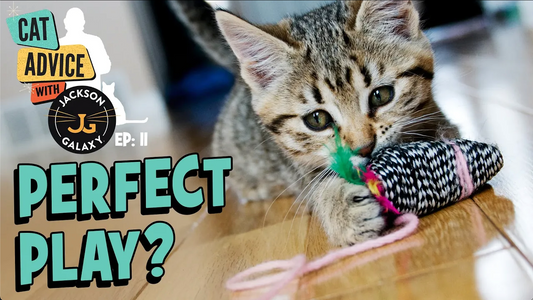Published April 23, 2020
Check out our full list of General Information & Resources regarding COVID-19 and Companion Animals: jacksongalaxy.com/covid19
As the COVID-19 pandemic continues to unfold, developments break that can be confusing - and sometimes unsettling. For animal lovers like yourself, that was the case yesterday when news broke that two domestic cats in New York State tested positive for the virus. The two cats (living in separate areas of the state), experienced mild respiratory symptoms and are expected to fully recover. In one case, the cat contracted the virus from a family member, and in the other, where the cat spent time outside, it was likely contracted from someone in the neighborhood.
We were first made aware of human-to-animal transmission of the virus a few weeks ago when a tiger at The Bronx Zoo became ill after coming into contact with an infected zookeeper. Knowing now that domestic animals can also contract the virus the same way is sad news - but not completely unexpected. Even though public health officials are still learning about COVID-19, what was apparent in the case of the big cats a few weeks ago holds true for the domestic cats today. In other words, there is no evidence that pets play a role in spreading the virus in the United States. Our animal family members can contract the virus from humans, but there is little to no risk of the opposite happening.
At the same time, it’s important that we keep our animal family members safe from contracting this virus in the first place. Until we know more, The Centers for Disease Control (CDC) recommends the following:
- Do not let pets interact with people or other animals outside the household.
- Keep cats indoors when possible to prevent them from interacting with other animals or people.
- Walk dogs on a leash, maintaining at least 6 feet from other people and animals.
- Avoid dog parks or public places where a large number of people and dogs gather.
If you are sick with COVID-19 (either suspected or confirmed by a test), restrict contact with your animals, just like you would around other people.
- When possible, have another member of your household care for your pets while you are sick.
- Avoid contact with your pet, including petting, snuggling, being kissed or licked, and sharing food or bedding.
- If you must care for your pet or be around animals while you are sick, wear a cloth face covering and wash your hands before and after you interact with them.
For more information on this matter, please visit the CDC website below:
cdc.gov/media/
It is vitally important, in this time of so much uncertainty and fear, that we cling tightly to the science we are given and not the storylines we hear casually. Initial panic will cause many to surrender their companion animals to shelters or just let them go. It is up to us to tell each and every person we know to stay up to date with the facts, keep our wits about us, and not let this virus rob us of our empathy and compassion for all - whether they have two legs or four.
With Light, Love & Mojo,
Jackson Galaxy
This article was published on April 23rd, 2020. The above CDC guidelines were released on April 22, 2020. Please visit the official CDC website for the most up to date information.













